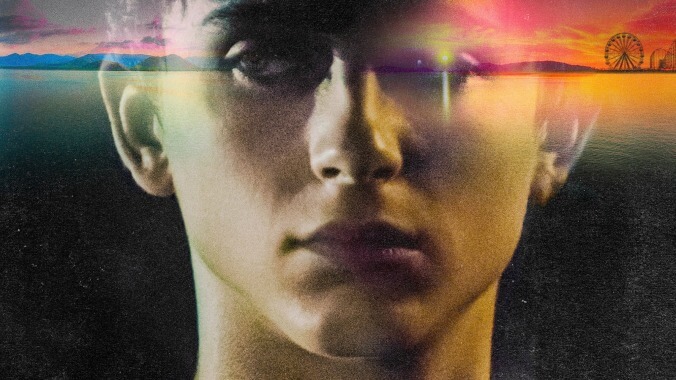Timothée Chalamet is an unlikely drug dealer in the insipid, derivative Hot Summer Nights

It’s the summer of 1991 in Cape Cod, a hormonal tragedy crudely destined to end in the billion-dollar biblical cataclysm of Hurricane Bob. The haves are the yachters, vacationers, and tennis-racket preppies. The have-nots are the townies: Hunter Strawberry (Alex Roe), the local prince of pot, a stud with a rumored 11-inch dick; his sister, McKayla (Maika Monroe), the bubblegum-chewing black-widow crush object of the local sweaty-palmed teen boys. If our narrator, an unnamed and omniscient 13-year-old (Shane Epstein Petrullo), is to be believed, her first boyfriend drowned and another hung himself when they broke up. It’s a law of nature that the have-nots should have what the haves want most: drugs, sex appeal, danger.
Enter Daniel Middleton (Timothée Chalamet), an asthmatic wearer of rugbies and polos, and a character of indeterminate motivation and personality who will become Hunter’s unlikely drug-dealing partner and put the moves on McKayla behind her brother’s back. To inaugurate his descent into a life of crime, Daniel takes his first-ever bong rip and falls straight over, cueing a title card that sums up the aesthetic of Hot Summer Nights: It looks like a VHS tape that’s been played too many times. While some movies wear their influences, Elijah Bynum’s insipid debut feature wears its out: the sped-up camera moves, whip pans, and cocaine hijinks of Goodfellas and Boogie Nights; the narration of The Virgin Suicides; the antisocial doom of Donnie Darko; a touch of American Beauty and early Wes Anderson. It’s safe to say that, unlike his characters, Bynum came of age in the early 2000s.
An obvious point is that most of these films are themselves full of film references; Boogie Nights, for one, riffs on a number of Martin Scorsese movies, including Goodfellas. But while pastiche is a tool of art (the old credo: it’s not where you get it, but where you take it), Bynum’s awkwardly voguing style is pure film school Mad Libs. Thus, we get William Fichtner as a creepy drug dealer with a disco ball in his living room, doing a simplistic take-off of the Alfred Molina scene in Boogie Nights, or a sequence in which Hunter pistol-whips a jagoff in Boston like he’s Joe Pesci in Casino before hopping into a car that glides off into the night to Can’s “Vitamin C” à la Inherent Vice. His endowment and red sports car are Dirk Diggler-ian, but his personality is basically that of a greaser from a baby boomer movie about the ’50s.
But at least that cut-and-paste method gives his character some definition, which is more than be said for Daniel or McKayla; the former is erratically written and latter is just there to be objectified. Every now and then, Bynum introduces a new, unnecessary supporting character just for the sake of throwing in another expository montage, or drops in a great song. (He gets the best use out of the Modern Lovers’ “Hospital,” which plays over a shot of two teens necking in silhouette in front of a Ferris wheel.) But for all of this ersatz panache, the plot of Hot Summer Nights is both groan-inducingly contrived and vapid, its talented young cast wasted on an incoherent script—less a web of betrayal, greed, and adolescent desire than a few dangling threads. The hurricane arrives to wash Cape Cod clean. But the only wrath-inducing Old Testament sin here is idolatry.